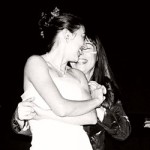Title
While the concept of cohabitation is becoming socially acceptable, I have always dreamed of a big, fabulous, fairly traditional wedding. I wanted the flowing white dress, a gorgeous bouquet of flowers, the expensive hairdo I would normally never pay for, the post-ceremony walk down the aisle accompanied by applause from family and friends, the ultra-posed wedding photos, and the traditional first dance where my new spouse and I clumsily make our way around the dance floor, smiling as onlookers take tons of pictures and I get dipped ever so slightly at the end.
Body
Realizing I am gay raised many questions with which I grappled, not the least of which was, does coming out mean having to give up my fairytale wedding dream?
When I met Mary Ellen and we realized we wanted to spend the rest of our lives together we thought about the “anything but marriage” route. I’d move into her place, we would each create a will and probably register as domestic partners. But that didn’t feel right to either of us. We wanted the sense of a sanctified commitment—as well as the social recognition from those closest to us. And since we met in church, we thought it appropriate that we celebrate our union in the place that brought us together.
To me, the gay marriage debate is stuck in a discourse on semantics. Marriage is defined as the union of a man and a woman and this strict definition is often perpetuated by members of the very institution that brought us together, the church. Mary Ellen and I can love each other, co-mingle our possessions and start a joint bank account—but we can not be legally married. That argument bypasses what I think is the key issue and why my wife and I decided to get married: we did not want to make a political or social statement—we simply wanted to declare in front of our friends and family our desire to share the rest of our lives with each other. And as people of faith, we wanted to make this commitment with our pastor in a holy space that accepts us.
And so we were married in New York City on November 12, 2005, and two years later we are still quite pleased with our decision to have a wedding—albeit one that New York State does not recognize. Friends still talk about what a wonderful time it was, how the ceremony was so personalized and special, and the reception so much fun. Mary Ellen let me pre-choreograph our first dance so we have hundreds of photographs of us moving gracefully across the dance floor. Our apartment walls are adorned with plenty of traditionally posed post-wedding photographs. I often glance down at my wedding band, which everyone at the ceremony held before we put them on our fingers, and think that everyone who is dear to us blessed this band, and our union.
By the end of our reception I don’t think anyone in the room thought of it as simply a lesbian wedding, or a political statement. It was our special moment to become a family —and a day that I will treasure for the rest of my life.





